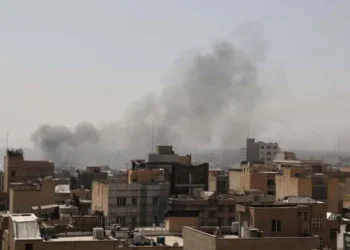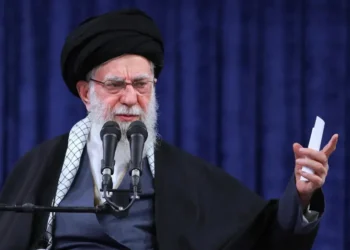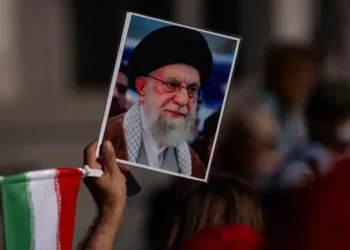Eerik-Niiles Kross is an Estonian politician and diplomat. In Estonia, he served as the head of intelligence from 1995 to 2000, and as national security advisor to former President Lennart Meri in 2000 and 2001. Dubbed by Politico as “The Baltic James Bond” and ranked the 23th most influential politician in Europe in 2018, Kross is best known as a security expert, having worked in Iraq, being responsible for creating the new Iraqi Ministry of Defense and Military Intelligence. He was an advisor to the Government of Georgia during and after its war with Russia in 2008, coordinating the Georgian information campaign.
We started by asking him about Ukraine’s bombing of the Suki airbase in Crimea, and how much of a hit it was for the Russian psychology.
“It gives the Ukrainians confidence, showing them that Crimea is not out of reach. It’s definitely a psychological blow to the pro-occupation population in Crimea, and the tourists there. For the Russian operational command, though, I don’t think it was such a big surprise, as they’ve been worried about it. They’ve been losing ammunition depots for weeks now, some of which are 90km behind the front line. I would think the Russian operational planners took it into consideration. I wouldn’t call it a strategic breakthrough yet, but the trend is positive.”
What do we expect Russia to do in retaliation?
They’ll probably do more of the same: routinely targeting random Ukrainian towns and villages. They’ll respond with what they know best – killing civilians. It doesn’t really change the balance on the battlefield.
How do you think this will affect the West’s willingness to further assist Ukraine? Is the narrative advocating for “not giving Ukraine weapons that shoot too far” finally put to rest?
It’s not going away, but the same people who said in the beginning that there was no sense giving the Ukrainians weapons, because it wouldn’t make any difference, the Russians would win anyway, are now saying “we can’t let the Ukrainians get more weapons, because it will backfire into an escalation.” I don’t understand that reasoning, myself. Russians have already escalated it to the hottest conflict since World War Two. The threat of nuclear escalation is low – they would have done it already, but we can’t disregard the nuclear power plant being used as a shield by the Russians. That said, the worst thing to do in response to a blatant open nuclear threat from the Russians, because they keep bringing it up rhetorically, would be to give into it. Going down that road would mean that anytime the Russians really want something, they can say “nuclear bomb,” and they get it. When would that end, with the Russians at La Manche?
Your Prime Minister seems to be unhappy with Russians being allowed to travel to Europe while their government kills innocents in another country. “To visit Europe is a privilege, not a right”, she says. Do you agree?
In principle, yes, of course I do. The Russians demand to be let into Europe, say they have nothing to do with the war, they just want to travel. But we can’t forget that Putin and his gang were voted in, maybe not fairly, in the last elections. Anyone who grew up in the Soviet Union and witnessed Putin coming to power had enough information to understand what they were about even in 2000. So to say that the Russian voter has nothing to do with it is wrong.
And then the behavior of many Russian tourists in Europe has not been exemplary: Cases of harassing Ukrainians or demanding Ukrainian flags be taken down. I don’t think we should stop giving Russians visas: we should keep open the possibility for them to defect if they want to, if someone needs protection.
I very much like the idea that has been floated by the Russian opposition, saying there should be some way for Europeans to start understanding who is who. To begin with, the idea is that in order for a Russian citizen to prolong a visa, or apply for residency, they first need to sign a written statement that says, “I’m against the war, the war is a criminal war, the sanctions need to continue until all of Ukraine is free and the war criminals are sentenced.”
Funnily enough, we had such an idea in Georgia, and the current government called it xenophobic.
[Laughs] I see. Well, at least right now, it seems there are several countries, not just the Baltic states, that are coming to the conclusion that you can’t entirely separate the Russians at war with the Russians demanding a vacation in Italy.
Onto the current August War debate. To your mind, when did it actually start – on the 7th or the 8th?
It’s a totally irrelevant debate: it started earlier and then it entered an active phase. The active planning of the war clearly started no later than April 2008. A lot of what happened during the summer can be seen as Russian maskirovka, getting ready for the escalation. On August 3, the Black Sea Fleet took off from Sevastopol towards Georgia. That was clearly part of the operation. On August 5, some units arrived in Tskhinvali. And there were already clashes- shelling of Georgian villages by the so called separatists, part of the chain of command, as we can see now in Ukraine, since 2014, this whole DNR, LNR, which is really part of the Russian military.
It’s quite educational to look at the whole Ukraine dynamic now and compare it with the Georgian war. It’s the same playbook and it’s the same way of handling things legally.
Russians have already escalated this to the hottest conflict since World War Two
If you look at Russian doctrine, the war includes preparing the information space so as to deceive the enemy, before the active military phase.
We certainly had a long debate over who started the war – didn’t Russia invade Georgia? Or did Georgia invade Russia? It sounds crazy today, if you think of Ukraine. All the red flags were on the map in summer 2008. You had the Russian exercises, you had the railway troops in Abkhazia, airspace violations, very aggressive rhetoric. You had shelling of Georgian villages, kidnappings, you had passportization. And still nobody in the West believed, or wanted to believe, but a lot of that information was available, at least to the Western intelligence service.
Pre-February 2022, the Americans took a very different approach and made all of their intelligence public. What it did, it took away from the table the debate over who started the war, because the Russians were trying to push for the same thing: “Genocide” in Donbas. Nobody debated on February 25 who had started it. If the West had taken Georgia’s warning seriously in the summer of 2008, and made the relevant information public, and tried to put some pressure on the Kremlin, it might have changed the ending. At the very least, this debate of who started it could have been avoided.
When you were advising the Georgian government, you were in charge of the international information campaign. Did Georgia win or lose the PR battle that Ukraine seems to be so decisively winning now?
I think at least the Russians believe that Georgia won the information war. The Western governments were very eager to see some kind of settlement. And, as we say, in Estonia, “No fish, no meat, let’s agree that no side is to be blamed: We give Georgia some funds to reconstruct, and let’s just stay at it.” That was the outcome. The Russians expected everybody to buy into the genocide story and thank Moscow for bringing peace to Georgia. That didn’t happen. The Russian goals were not met. For the Western audience, it was quite clear that the Russians were the invaders. They tried to lie from the beginning, and it was exposed right away. They had such big holes in their story that nobody really believed them. They claimed 2000 died in Tskhinvali and then it turned out to be 180, and let’s not forget it all happened on Georgian territory.
We’re not critical enough at this point. We think there’s still time to bring Georgia back
Numerous high-ranked Western politicians routinely claim to me that this part of the story is very important. If there is one thing I would like to disagree with you on, it is that “nobody bought the story,” because plenty of people did.
They’re probably the same people who now say “let’s have a ceasefire in Ukraine because of the bloodshed. Let’s give Russians territory, they’re asking nicely and why doesn’t Ukraine say ‘we will never join NATO,’ etc., etc.” It was absolutely clear, and it is even more so now, that Putin had decided to punish Georgia, to establish further military control over at least Abkhazia and South Ossetia. The plan was probably also to topple the government. The assumption was that “once we go in, we get rid of Saakashvili and we stop this nonsense about NATO.” So if Georgia retaliated to the days-long shelling of villages and killing of children, well, no government would be able to tolerate that, foreign military using heavy weapons against their people.
Negotiations were ongoing for months. It could have been avoided if Georgia had said, “Fine, we no longer want to join NATO. Fine, we want to be friends with Russia. Fine, we give you some of our territory”, but these would have been war goals achieved through pressure and threat. What also shouldn’t be forgotten is that the Russians have not fulfilled any of the six-point ceasefire plan. For Russia, a ceasefire is never a ceasefire. It’s just a continuation.
Three years ago, you said: “If the West continues the current appeasement policy towards Russia, it might cost us a lot in the near future.” What course would you advocate for now?
Well, right now it looks like the West has not entirely failed, and we have a chance to get this right. A lot of us would have liked the assistance to Ukraine to have happened faster and to be bigger, but, overall, mostly thanks to the Ukrainians themselves, who keep fighting, and keep the world in the fight, we’re on the right path. If Ukraine, together with the Western help, manages to kick the Russians at least back to the February 23 lines, preferably from all of Ukraine, that would give us time to realign and build in Europe, too.
The West has not entirely failed, and we have a chance to get this right
We will see a very new Eastern Europe, a renewal of military alliances, and you’d have, for the first time since 1919, from Finland to Romania, Ukraine, Poland, the Baltics, even Sweden, pretty much on the same page in their defense policy. There are no major frictions between those countries. It is a very hopeful situation. Of course, the Russians will do all they can to break that up and play those countries against each other, and then the Old West against Eastern Europe. But I think what this war has done is to reduce significantly the identity gap between the Old West and the new. You have Irish fishermen, asking for Ukrainian refugees to be supported through their Catholic priests; you have Spanish taxi drivers driving Ukrainian war refugees to Spain from the Polish border. It’s a new thing in Europe.
How would you rate the current Georgian political course?
It’s very worrisome. Countries like Estonia and Poland, the traditional allies and friends of Georgia, countries that supported Georgia in 2008, and have always supported Georgia’s NATO accession and EU accession, we’d say, “You are our friends, we need Georgia in the western realm.” It’s unfortunate to say that we are making the same mistake now with Georgia, as we did when we blamed the Western governments in 2000, like the Germans, Americans and French, for what they did with Russia in the 1990s.
The signs of off-railing from the democratic path are there – we see that the government is imprisoning the opposition, it’s closing down the media, it’s polarizing, it’s flirting with the Russians, it doesn’t respect the EU facilitated agreement with the opposition. And we are still saying: “but they are our friends and they’re actually good guys.” We’re not critical enough at this point. We think there’s still time to bring Georgia back. But if Georgia gets away with it, and says “the European values are not for us, we are different, but we still want the money,” and we say “yes,” well, back then, in the 1990s, for Berlin and Paris, it was actually in their interest: They wanted Russia to be a partner and do business with them. But you close an eye when Putin starts doing bad things, and we’re doing the same thing with Georgia, now, because we want Georgia to be in NATO and with us, it means the Georgian Government is getting away with things that they shouldn’t.
Interview by Vazha Tavberidze for RFE














